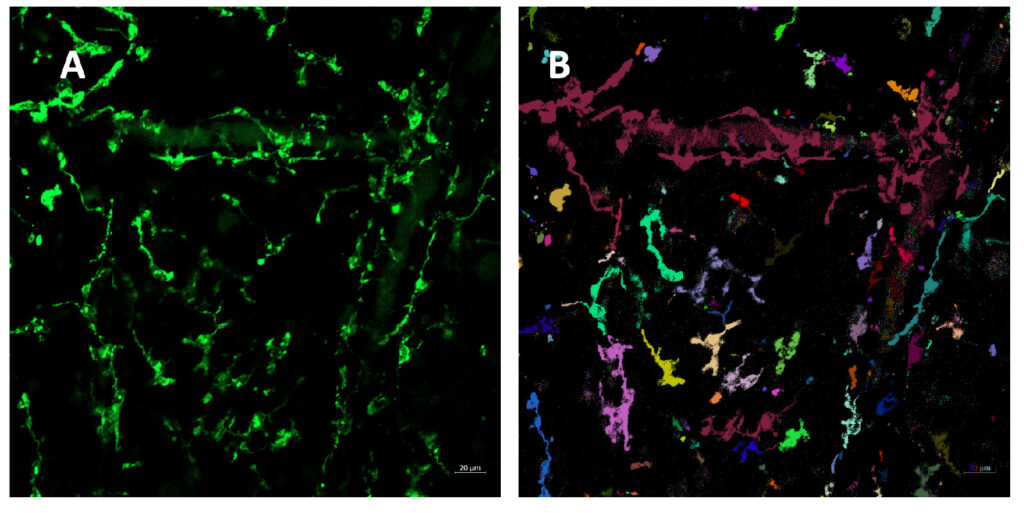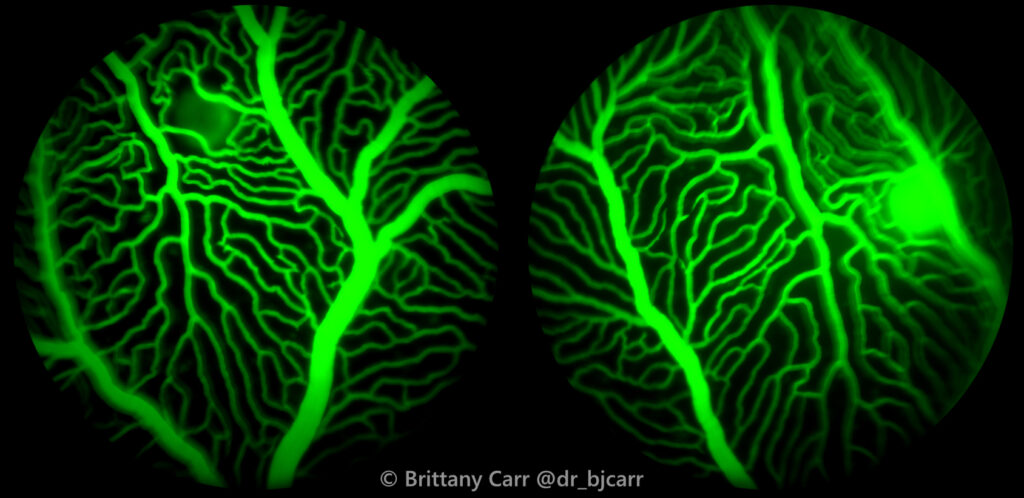The UBC Research Excellence Cluster in Vision: Molecules, Behaviour, Society (“Vision Cluster”) aims to shape the future of vision and brain research by connecting a network of diverse vision and brain researchers with scientific experts in cutting-edge technologies. The Vision Cluster is led by Dr. Joanne Matsubara, who is a member of the Djavad Mowafaghian Centre for Brain Health (DMCBH) and a professor in the Department of Ophthalmology & Visual Sciences.
In the Vision Cluster, foundational scientists and clinical researchers are teaming up with technical experts in a variety of fields, ranging from proteomics, super-resolution microscopy, neuroimaging and artificial intelligence, to biomedical engineering, ophthalmic imaging and e-health. Together, the Vision Cluster is developing novel technologies for the prevention, early diagnosis, and treatment of blinding eye and debilitating brain diseases.

This image shows human retinal microglial cells in wholemount z-stack. A: Iba-1 immunolabeling (Green) reveals many microglial profiles. B: Each microglia cell is automatically segmented and displayed in different colors using the BoneJ plugin in ImageJ. Photo credit: Harjot Bhandol, Phoenix Yin and Wissam Nassrallah
The formation of the Vision Cluster has been a long time coming. Capacity building and collaborations have been key to its creation and expansion. Supported by the Grants for Catalyzing Research Clusters from UBC’s Office of the Vice-President, Research and Innovation (VPRI), the Vision Cluster has grown to more than 50 faculty members, trainees, research staff, and affiliate members since its inception in April 2022, spanning over 20 UBC departments, centres, schools and units in the Faculties of Medicine, Science and Arts. Nationally and internationally, the Vision Cluster is partnering with vision researchers across Canada, the United States, and Europe.
The advisory committee and the members of the Vision Cluster are culturally diverse, They are composed of an equitable mix of female and male faculty members and trainees at multiple career and educational stages. Its members also come from many parts of the world including China, Korea, Nigeria, Germany, Iraq and Iran. Other DMCBH members involved in the cluster include Drs. Silke Appel-Cresswell, Deborah Giaschi, Hee Yeon Im, Kamyar Keramatian, Ipek Oruç, and Miriam Spering.
As the first of its kind in ophthalmology and vision science, the Vision Cluster is unique. In particular, the Vision Cluster aims to understand how we see the world around us, from the biological, the psychophysical and beyond. What happens when vision care is at a loss in a community? What happens when a partially-sighted person experiences the world through touch, sound and aroma? The Vision Cluster will explore the accessibility of vision care and the multisensory experience in our society. From urban to remote areas of British Columbia; from marginalized communities to Indigenous reserves; from exploring the visual world to other sensory experiences, the Vision Cluster will form a diverse team with community partners and patient partners to further the dialogue of the societal impact of sight loss.

This is an image of frog vitreal blood vessels that are flooded with a fluorescein sodium salt. This technique is used to see whether there are holes in the RPE cell layer of the eye or the check for leaky vessels. Photo credit: Dr. Brittany Carr
The Vision Cluster has bold dreams. With a strong focus on knowledge translation and community outreach, the Vision Cluster will amplify the voices of people living with sight loss, further the understanding of their perceptions of the world, and create new ways of interaction with artistic creations through science.
Monthly Vision Research Seminars, which began in September, will feature speakers from UBC, Canadian and American institutions, industry and community partners such as The Canadian National Institute for the Blind.
To keep up-to-date with the Vision Cluster, you can follow them on Twitter (@UBCVision), visit their website (vision.ubc.ca) or contact Dr. Ruanne Lai, Research and Knowledge Translation Facilitator, directly via email (ruanne.lai@ubc.ca).


